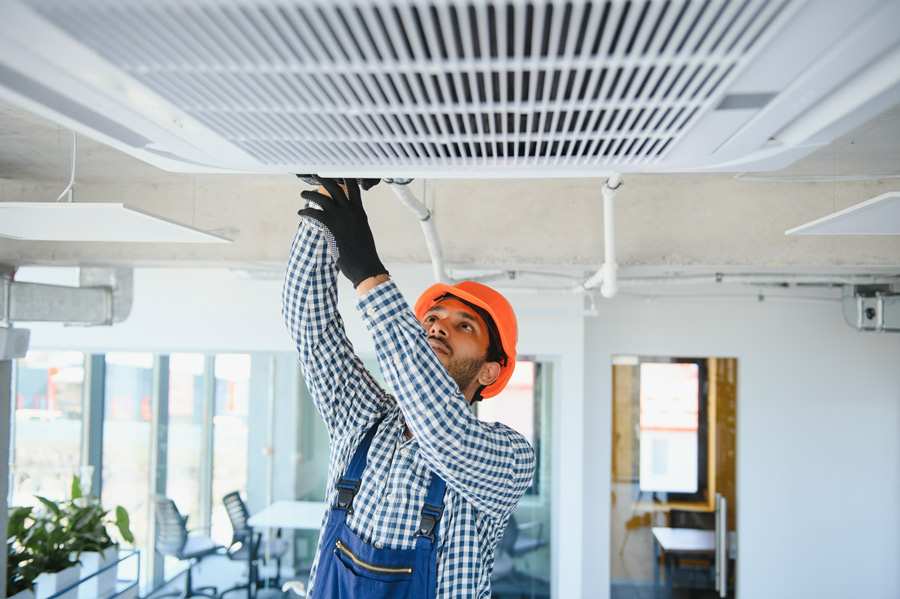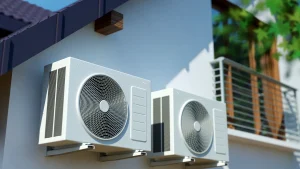The quality of the air inside our homes and workplaces significantly impacts our health, yet it is often an overlooked aspect of our daily lives.
Many people hold misconceptions about the role of air conditioning and ventilation, viewing them merely as tools for comfort rather than essential components for health.
This blog aims to dispel these myths by exploring the various health benefits of maintaining proper indoor air quality through effective air conditioning and ventilation systems.
Despite advances in technology and increased awareness of environmental health, indoor air quality remains a complex issue influenced by various factors including building materials, external pollutants, and everyday household activities.
Understanding how to manage these factors with the aid of air conditioning and ventilation can lead to a marked improvement in both physical and mental health, providing a cleaner and safer indoor environment.
Understanding Air Quality and Its Impact on Health
Good indoor air quality is essential for maintaining a healthy environment, yet it is frequently compromised by pollutants such as dust, pollen, and chemical vapours.
These contaminants can originate from a variety of sources inside and outside the home, including furniture, paints, cleaning products, and outdoor air pollution.
Recognising these sources is the first step towards mitigating their effects and improving the air we breathe indoors.
The impact of poor indoor air quality on health can be profound. Prolonged exposure to polluted indoor air can lead to respiratory problems, allergic reactions, and even long-term health issues such as asthma and heart disease.
Children, the elderly, and those with pre-existing health conditions are particularly vulnerable to these effects, making it crucial to prioritise air quality in homes, schools, and workplaces.

Benefits of Proper Air Conditioning
Air conditioning systems do more than just cool the air; they can play a pivotal role in filtering out airborne allergens and pollutants.
By maintaining a controlled indoor environment, air conditioners prevent the accumulation of dust and pollen, which are common triggers for allergies and respiratory conditions.
Regular maintenance of these systems ensures they function efficiently, providing optimal air quality and minimising health risks.
Moreover, air conditioners help in maintaining appropriate indoor humidity levels. Excess humidity can encourage the growth of mould and dust mites, both of which are known to exacerbate allergies and asthma.
By keeping humidity levels within a healthy range, air conditioning systems prevent the proliferation of these allergens and contribute to a healthier indoor environment.
Advantages of Effective Ventilation
Ventilation is critical in maintaining healthy indoor air. It involves the exchange of indoor air with fresh outdoor air, which helps to dilute and remove airborne pollutants from indoor spaces.
Effective ventilation is particularly crucial in high humidity and crowded areas, where the risk of air quality deterioration is significant.
By continuously introducing fresh air, ventilation systems reduce the concentration of contaminants and help maintain a healthy living environment.
Proper ventilation also helps in controlling odours, removing moisture, and reducing the accumulation of airborne contaminants such as smoke, bacteria, and viruses.
These benefits are vital for maintaining a comfortable and healthy indoor climate, especially in environments like kitchens and bathrooms, where odours and moisture are more prevalent.

Air Conditioning and Respiratory Health
Air conditioning can significantly benefit individuals suffering from respiratory conditions by providing a cleaner air environment. These systems are designed to filter out particulate matter and allergens, reducing the risk of asthma attacks and other respiratory complications.
For individuals with chronic respiratory conditions, this can mean fewer symptoms and a potentially higher quality of life.
Regular maintenance of air conditioning units is crucial to ensure they continue to operate effectively and provide these health benefits. This includes regular cleaning and replacement of filters to prevent the circulation of old pollutants back into the room.
Properly maintained air conditioning systems not only support respiratory health but also improve the overall indoor air quality.
Enhancing Mental Well-being Through Air Quality
Studies have shown that there is a clear link between air quality and mental well-being. Poor indoor air quality can lead to cognitive decline, increased stress, and poor mood levels, affecting overall mental health.
Conversely, clean air can enhance cognitive function, mood, and even productivity. Ensuring good air quality through proper air conditioning and ventilation can therefore play a crucial role in enhancing mental well-being.
Practical measures to enhance indoor air quality include the use of air purifiers, maintaining natural ventilation, and choosing furnishings and building materials that emit lower levels of volatile organic compounds (VOCs).
By taking these steps, individuals can create a more conducive environment for mental and emotional health, which is especially important in places where people spend the majority of their time, such as homes and offices.

Economic Benefits of Maintaining Air Quality
Investing in good air quality is not only beneficial for health but also makes economic sense. Improved air quality can lead to fewer health-related expenses due to respiratory diseases and allergies, which are often exacerbated by poor indoor environments.
Additionally, employees in offices with high air quality are generally more productive, which can translate into better work performance and reduced absenteeism.
The economic benefits also extend to educational settings, where good air quality can contribute to better concentration and performance among students.
Investing in proper air conditioning and ventilation systems is therefore a cost-effective measure that can significantly enhance learning outcomes.
Conclusion
In conclusion, proper indoor air conditioning and ventilation are far more than just mechanisms for maintaining a comfortable temperature; they are vital tools for improving health and well-being.
The link between good air quality and reduced health risks enhanced mental state, and economic savings is well-established, emphasizing the importance of investing in effective air conditioning and ventilation systems.
It’s clear that the benefits extend beyond comfort, providing significant returns in terms of health and efficiency.
Understanding and implementing quality air conditioning and ventilation solutions can profoundly affect our health and quality of life.
As we continue to spend a considerable amount of time indoors, it becomes increasingly important to ensure that our environments are conducive to health and well-being.
Encouraging awareness and proper maintenance practices will go a long way in promoting healthier living spaces that support both physical and mental health effectively.







